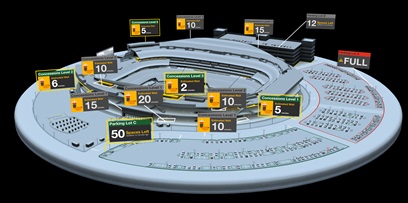Digital twins on the manufacturing menu – with help from the hyperscalers
SOURCE: HTTPS://WWW.IOTTECHNEWS.COM/
NOV 16, 2023
PwC, Microsoft collaborate on "digital twin" product for venues
SOURCE: SPORTSBUSINESSJOURNAL.COM
APR 12, 2022

PwC and Microsoft have teamed up to create a "digital twin" product that uses a whole suite of technology to help venue operators improve the fan and employee experience, maximize the building’s efficiencies and generate revenue. The product, which has been adopted by a yet-to-be-revealed major league team, is built with Microsoft technologies like Dynamics 365, Azure Analytics and Cognitive Services. A 3D digital twin of a site’s entire footprint is captured via Microsoft’s Holoset VR/AR headset, and it provides a single source of information from systems like waste management, traffic and parking, security, food and beverage, with live data captured from fan movement and back-of-house systems, such as utilities. “The first step in implementing the technology is knowing what different experiences and specific business outcomes you are looking for,” said Matt Hobbs, PwC Microsoft practice leader at PwC US. “What are the uniquenesses that you want?”
CLOUD COVER: By leveraging the data from the cloud technology, venue operators can drive operational efficiencies while creating premium experiences for the people who work, live and play at the venue. For example, venue infrastructure designs used to be three-ring binders of blueprints thrown in a file cabinet after the building opens and only dug out again when there is an emergency, like a burst water pipe. By creating a digital twin, an operator can see how the pipes were built and where to shut off the valve, in real time. The system can be integrated with other CRM and gameday software. From a team perspective, a digital twin offers another asset to sell to its corporate partners. For example, a pub near the venue can partner with the team and if the cloud detects a slow postgame egress, a message can be sent inviting the fans to come inside and wait until traffic subsides. “The Azure digital twin is designed to increase a team’s revenue per fan,” said Ashley Haynes-Gaspar, Microsoft’s COO of US business applications and industry clouds. “It helps create both physical and virtual memories. The virtual modeling can anticipate crowd congestion, for example, and it can allow fans to see things like a player’s real-time pregame routine.” Additionally, smart venues can help venues attain higher environmental standards by tracking energy waste and carbon emissions.
GOING TO MARKET: The marketing of the rollout is being handled jointly by PwC and Microsoft. London Resort, an under-development theme park in the U.K., recently became the product's first official client.
LATEST NEWS
WHAT'S TRENDING


Data Science
5 Imaginative Data Science Projects That Can Make Your Portfolio Stand Out
OCT 05, 2022

SOURCE: HTTPS://WWW.IOTTECHNEWS.COM/
NOV 16, 2023
SOURCE: HTTPS://AITHORITY.COM/
OCT 03, 2023
SOURCE: HTTPS://WWW.SCIENCEDAILY.COM/
AUG 08, 2023
SOURCE: HTTPS://WWW.GLOBALLOGIC.COM
JUL 06, 2023
SOURCE: HTTPS://INDIAAI.GOV.IN/ARTICLE/HOW-DIGITAL-TWIN-TECHNOLOGY-WILL-EVOLVE-IN-2023
JUL 04, 2023
SOURCE: HTTPS://WWW.CNBC.COM/2023/01/21/DIGITAL-TWINS-ARE-SET-FOR-RAPID-ADOPTION-IN-2023.HTML
JUN 30, 2023